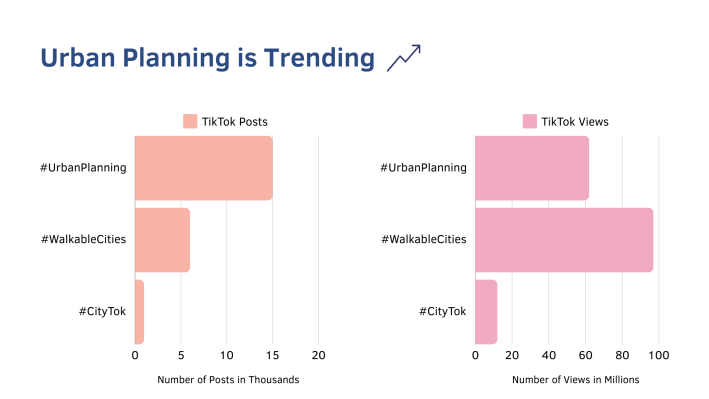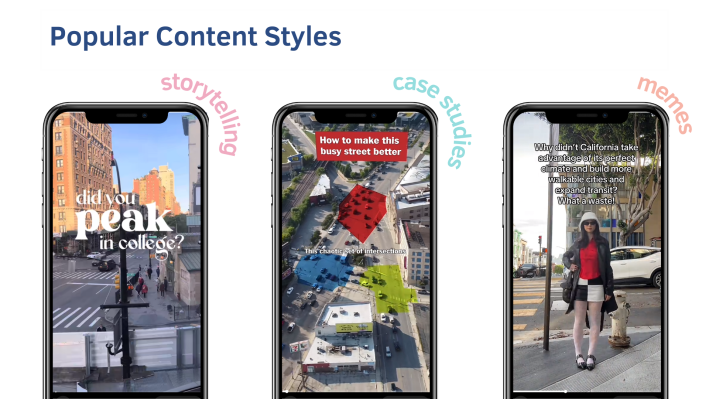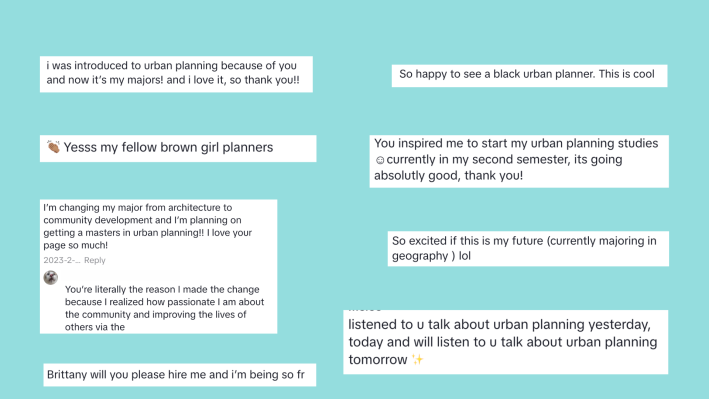This article was originally published in Transportation Alternatives’ Vision Zero Cities Journal as part of the 2024 Vision Zero Cities conference.
When were you first introduced to urban planning? Some may just happen to know an urban planner, or maybe they took a class in college that discussed urban planning topics. In today’s digital age, people of all ages, but particularly Gen Z, are learning about urban planning and its widespread impacts online. Digital algorithms are shaping the public’s understanding of city design.
“Urban Planning TikTok” has become a space for planners and non-planners alike to explore new interests, start and engage in discussions, hear different perspectives, and learn how to get involved. Content creators are demystifying the field of planning for millions; Vision Zero advocates should leverage online platforms to educate viewers on the infrastructural, economic, and social impacts of car culture in the United States. If done strategically, online content can help viewers see how their communities are impacted and empower them to act. Urban Planning TikTok presents an opportunity to learn and then translate that new interest into tangible change.
A Nontraditional Introduction to Urban Planning
Urban planning is trending online. TikTok, a short-form video platform that has facilitated the widespread knowledge-sharing of topics such as city design and the built environment, is making it easier than ever to disseminate information and engage with it. Urban planning and related keywords, such as walkable cities and CityTok are raking in millions of views and thousands of posts. Not only are people watching planning content, but many are also creating planning content.

Urbanists, enthusiasts, and urban planners use social media platforms to raise awareness about urban planning and its related byproducts. Content creators leverage a mix of video styles to expand their reach. Popular content styles include:
- Storytelling: A goal of storytelling TikToks is to connect the dots between the viewers’ lived experiences and urban planning. (@signedbritt)
- Case Studies: The appeal of content featuring case studies is showing how cities around the country approach city design. (@streetcraft)
Memes: Trend-based memes are quick hits that make the point quickly and entertainingly. (@traingirlsummer)

The TikTok algorithm is powerful. Without explicitly knowing the term “urban planning”, many people inherently have interests that tie back to the field, such as housing, sustainability, and transportation. People from all walks of life are being introduced to the field for the first time. For many, these online videos are putting words to what they’re experiencing in their own cities: why we feel lonely in car-centric cities, how walkability (or the lack thereof) can make or break college life, or the importance of safe streets for community wellbeing. Now that the creators have caught the viewers’ attention, what now?
Impact of #UrbanPlanningTikTok on Viewers
What does it mean to have an engaged audience, one that is ready to learn, engage, and act? If you ask urban planning content creators, myself included, what led them to lean into city design content, of all things, they’ll likely respond with some iteration of “no one knows what urban planning is”. In that same breath, they may share that they too had a “late” introduction to planning, likely in their college years by complete chance, if not later. That’s a big deal. Everyone should know what urban planning is because it impacts everyone so deeply.
Urban planning’s popularity has helped educate the public on the built environment. Viewers and creators have gained and nourished new interests in topics such as car centricity, zoning, 15-minute cities, and more.
TikTok viewers don’t only like, comment on, and save urban planning videos; many go a step further and take their newfound interest off of the app to dig deeper by reading planning literature or listening to planning podcasts. Other viewers feel empowered to take action to make local change by voting, attending local government meetings, joining their block club, and more. Planning content has also proven to be helpful to not only “lay people”, but to other planners, elected officials, and policymakers as well.

Impact of #UrbanPlanningTikTok on the Field of Urban Planning
Social media has provided a new way for planners to communicate, engage, and collaborate with communities. Now more than ever, planners can hear a greater diversity of voices within the community, including those who typically don’t participate in formal planning processes.
Despite advances in the field, as of 2021, 78% of urban planners were white, according to the 2021 U.S. Census. The average worker is in their early to mid-40s. If the field, and as a result, the built environment, is entirely shaped by people who don’t reflect the communities they’re working in, cities will continue to be inaccessible and inequitable spaces.
By putting urban planning and the work of urban planners on a major stage, there’s an opportunity to diversify the field itself and people who engage in planning processes, formally and informally.
#UrbanPlanningTikTok + Gen Z
Gen Z is perhaps uniquely positioned to engage with urban planning, as the first generation to never know a time without the internet within hand’s reach. Gen Z-ers have displayed time and time again through internet-based organizing that they have been disillusioned and are ready to take action.
Technological and cultural circumstances may further push Gen Z toward decentralizing car culture: the popularization of micromobility, the introduction of remote work, a growing interest in living in walkable cities, concerns about climate change, and the ever-increasing cost of personal car maintenance. And yet, Gen Z is still surrounded by auto-centric development; however, this front-row seat to communities designed exclusively for car use has shaped how Gen Z views their cities. And while they may be forced to drive, they may be more open to alternatives than older generations.
This generational shift gives us, urban planners, Vision Zero advocates, policymakers, and other stakeholders a leg up. We have an opportunity to show people that there are realistic alternatives to car-centricity that will create safer streets, healthier neighborhoods, and more equitable communities. Crafting policies that will support and fund pedestrian-centric infrastructure plays a major role in dismantling car-centricity as the norm, but so does shifting public opinion and building their support for change.
The impact of #UrbanPlanningTikTok can go far beyond a video that appears on your For You Page; we might just get better cities out of it.






